Items
Search full-text
“Commonwealth Disability Strategy launched in December 1994”
- Carriageworks
-
"Bree Hadley (2020) Allyship in disability arts: Roles, relationships, and practices. Research in Drama Education, 25(2), pp. 178-194.” "In this article, I propose that investigation of allies, ally skills, and allyship in disability arts is overdue. I articulate some of ways in which non-arts approaches to allyship need to be adapted to meet the needs of disabled artists, given the aesthetic as well as professional and social dimensions of allyship distinctive to disability arts. In doing so, I highlight the need for new theory, terminology, and frameworks to define the different approaches to allyship, developed by different artsworkers, operating in different roles, across the different domains of disability arts and/or arts and disability practice."
-
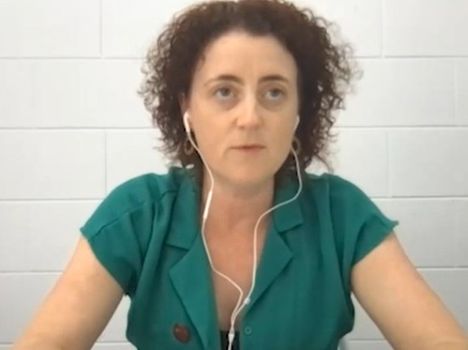 "Interview with Alison Richardson" Alison Richardson is an ally and advocate for people with disability with experience as an inclusive arts organisation artistic director and access and inclusion officer. Interview Summary Alison Richardson, artistic director and CEO of Crossroad Arts at the time of the interview, has had a 25-year journey through the fields of drama, theatre, and inclusive arts, starting in Sydney and leading to her role in Mackay, Queensland. Her work began by engaging with diverse young people and evolved into a focus on disability arts, recognising a gap in services and opportunities for people with disabilities in artistic expression. Throughout her career, she has witnessed and contributed to the gradual increase in visibility and opportunities for artists with disabilities, acknowledging the fluctuating support and funding in the sector. Despite challenges, Alison has observed progress in how disability arts are valued and the emergence of conversations around identity and representation within this community.
"Interview with Alison Richardson" Alison Richardson is an ally and advocate for people with disability with experience as an inclusive arts organisation artistic director and access and inclusion officer. Interview Summary Alison Richardson, artistic director and CEO of Crossroad Arts at the time of the interview, has had a 25-year journey through the fields of drama, theatre, and inclusive arts, starting in Sydney and leading to her role in Mackay, Queensland. Her work began by engaging with diverse young people and evolved into a focus on disability arts, recognising a gap in services and opportunities for people with disabilities in artistic expression. Throughout her career, she has witnessed and contributed to the gradual increase in visibility and opportunities for artists with disabilities, acknowledging the fluctuating support and funding in the sector. Despite challenges, Alison has observed progress in how disability arts are valued and the emergence of conversations around identity and representation within this community. - Melbourne Symphony Orchestra
- Rhonda Whitaker
- Rhonda Whittaker
- Maria Filippow
- Jenny McCarthy
- Jeff Stewart
- Dinny Downie
-
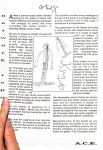 "Accessible Arts - ACE Arts Creativity Expression - Juliet London - Article: Artwise -1994 - Iss9, Pg22-23" Accessible Arts - ACE Arts Creativity Expression - Juliet London - Article: Artwise -1994 - Iss9, Pg22-23 - reads, in part "Artwise, a Lismore-based artists' initiative catering for the needs of artists with varying intellectual and physical challenges, has changed its name! We have succeeded, after twelve months, in becoming officially incorporated. We are now known as Growth Through Art Artwise the Lismore Inc., although the company sign at the doorway still proudly announces simply Artwise."
"Accessible Arts - ACE Arts Creativity Expression - Juliet London - Article: Artwise -1994 - Iss9, Pg22-23" Accessible Arts - ACE Arts Creativity Expression - Juliet London - Article: Artwise -1994 - Iss9, Pg22-23 - reads, in part "Artwise, a Lismore-based artists' initiative catering for the needs of artists with varying intellectual and physical challenges, has changed its name! We have succeeded, after twelve months, in becoming officially incorporated. We are now known as Growth Through Art Artwise the Lismore Inc., although the company sign at the doorway still proudly announces simply Artwise." -
“The Australian Government’s Creative Nation policy released in 1994” ‘Creative Nation’ was released in 1994. This was the first ever cultural policy formally developed by an Australian Government. Alongside a number of art forms, the policy included establishments like libraries in its definition of culture and pledged $250 million in funding to cultural organisations.
- Jane Trengove
-
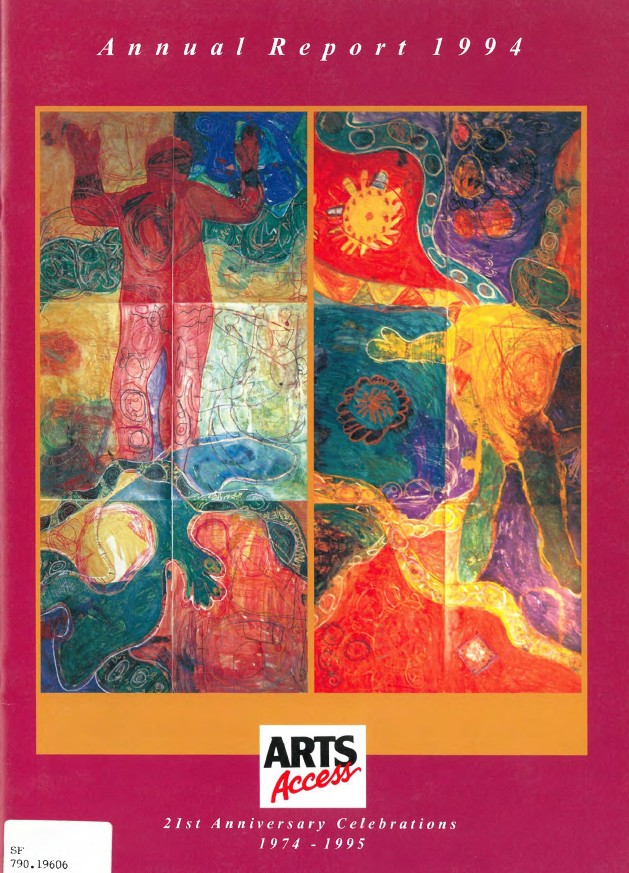 “Arts Access Victoria – Annual Report 1994”
“Arts Access Victoria – Annual Report 1994” -
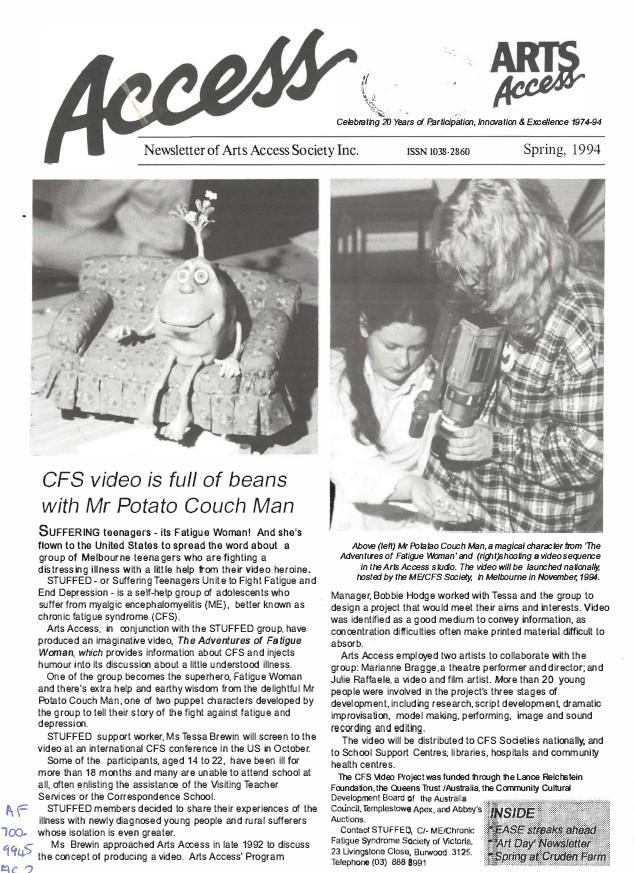 “Arts Access Victoria - Access Newsletter Spring 1994”
“Arts Access Victoria - Access Newsletter Spring 1994” -
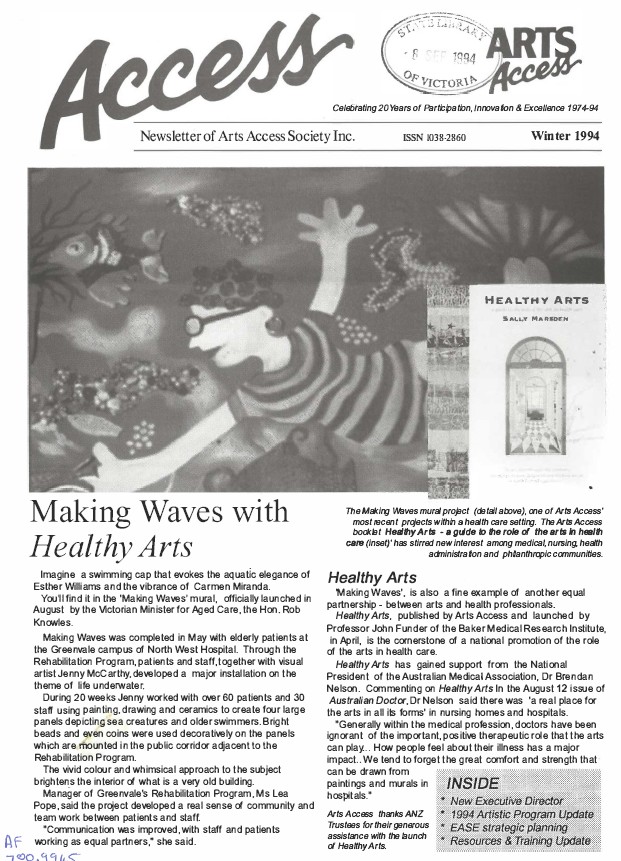 “Arts Access Victoria - Access Newsletter Winter 1994”
“Arts Access Victoria - Access Newsletter Winter 1994” -
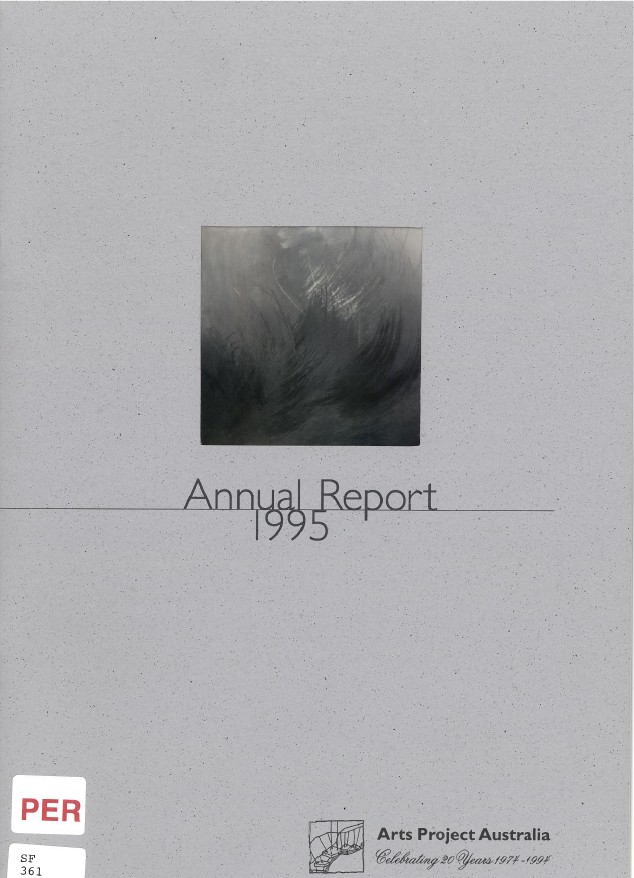 "Arts Project Australia - Annual Report 1995"
"Arts Project Australia - Annual Report 1995" -
“Genni Batterham stages a protest at the opening of Bondi Junction railway station 1979, makes film in 1980” When Bondi Junction railway station opened in 1979, Genni Batterham staged a protest about the lack of accessible transportation options for individuals with disabilities. After receiving a multiple sclerosis diagnosis in 1978, Genni became severely disabled very quickly. She did everything in her power to stop the disease's progression and was furious at being "consigned to the world of the disabled." The 1979 Bondi Junction protest was an important moment in the history of the Disability Rights Movement in New South Wales. The Premier, Neville Wran, later said that the experience led him to developing the Disability Taxi Service, the first public transport system designed for people with disability to be launched in Australia. Batterham then made the film ‘Pins and Needles’ (1980) with her husband Kim. Under the direction of Barbara Chobocky and with funding from the Australian Film Commission's Women's Film Fund, the film was screened in five different countries, took home first place at the 1980 Canadian Film Festival, and took home second place at the 1980 New York Film Festival. Genni and Kim would then collaborate on three further films about the phases of her life: Where's the Give and Take? (1981), Artreach (1982), and Riding the Gale (1987).
-
“Arts Access Victoria launches the disability arts festival Alter State” In 2021, Arts Access Victoria launched Alter State, a major disability arts festival celebrating contemporary art and live performance with artists from Australia and Aotearoa (New Zealand). “In October 2022, the inaugural Alter State presented 28 performances, including 5 world premiere events, schools’ shows and 14 different types of art forms, as well as 32 films, in-conversation sessions, and workshops.”
-
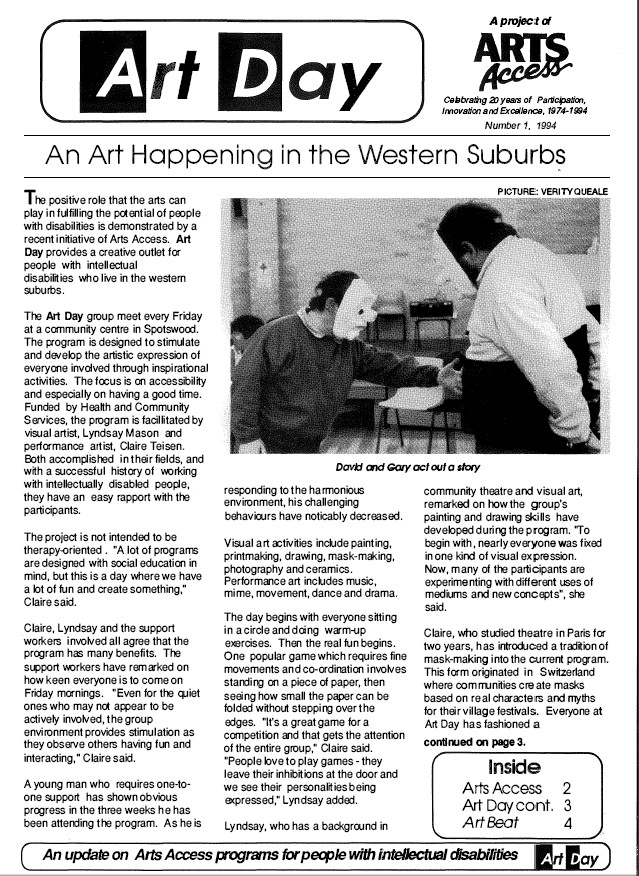 “Arts Access Arts Access Art Day Number 1 1994” Arts Access Arts Access Art Day Number 1, 1995 – Description of Arts Access programs for people with intellectual disabilities, Description of the Artistic Program, the Resource and training unit and the EASE program, Art Beat - Performance Art Options for People with Intellectual Disabilities – workshops, Big Bag rock band and Back to Back theatre company - Barbara Doherty, Carol Downey, Claire Teisen, David (no last name listed), Dean Michael, John Tonso, Kerrie (no last name listed), Lyndsay Mason, Maria (no last name listed), Sonia Teuben
“Arts Access Arts Access Art Day Number 1 1994” Arts Access Arts Access Art Day Number 1, 1995 – Description of Arts Access programs for people with intellectual disabilities, Description of the Artistic Program, the Resource and training unit and the EASE program, Art Beat - Performance Art Options for People with Intellectual Disabilities – workshops, Big Bag rock band and Back to Back theatre company - Barbara Doherty, Carol Downey, Claire Teisen, David (no last name listed), Dean Michael, John Tonso, Kerrie (no last name listed), Lyndsay Mason, Maria (no last name listed), Sonia Teuben - John Tonso
-
"Liz Ferrier (2000) Vulnerable Bodies: Creative Disabilities in Contemporary Australian Film. In Ian Craven ed. Australian Cinema in the 1990s. Routledge. https://doi.org/10.4324/9780203045022" Reads, in part "The internationally-acclaimed film Shine is one of a number of contemporary Australian movies which portray embattled artists or performers. Reminiscent of earlier works such as Starstruck (1982), Man of Flowers (1983), Malcolm (1986) and Sweetie (1989), and several more recent productions – Proof (1991), Strictly Ballroom (1992), Bad Boy Bubby (1994), The Adventures of Priscilia, Queen of The Desert (1994), Muriel's Wedding (1994), Cosi (1996), Lilian's Story (1996), and Jane Campion's New Zealand/Australian films, An Angel at My Table (1990) and The Piano (1993) – it depicts a disadvantaged individual overcoming setbacks through the passionate and eccentric expression of his creativity. The film and the cycle to which it belongs offers a peculiar vantage point from which to examine the problems and possibilities of Australian cinema in the 1990s."
-
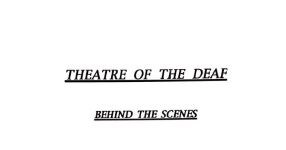 "Australian Theatre of the Deaf - Behind the scenes history" Behind the scenes History of Australian Theatre of the Deaf, until 1994, noting current staff Julia Cotton, Gillian Minervini, and Pam Spicer - earliest productions in the 1970s "King Lear", "Rogues and Clowns", "Five Flights to Freedom’" - recent productions using the Company's trademark visual style - "Wolfmoon", Culture Shock”, “Tunnel Vision”, “Shape UP!” – performer appearances in Australian television - “GP”, “The Money or the Gun”, “A Country Practice”, and other acheivements
"Australian Theatre of the Deaf - Behind the scenes history" Behind the scenes History of Australian Theatre of the Deaf, until 1994, noting current staff Julia Cotton, Gillian Minervini, and Pam Spicer - earliest productions in the 1970s "King Lear", "Rogues and Clowns", "Five Flights to Freedom’" - recent productions using the Company's trademark visual style - "Wolfmoon", Culture Shock”, “Tunnel Vision”, “Shape UP!” – performer appearances in Australian television - “GP”, “The Money or the Gun”, “A Country Practice”, and other acheivements -
“Arts Access Australia launches Meeting Place” Arts Access Australia launched Meeting Place in 2012, an annual forum where artists and industry leaders meet to discuss arts and disability and to network. The forum includes keynotes, panels, and workshops.
-
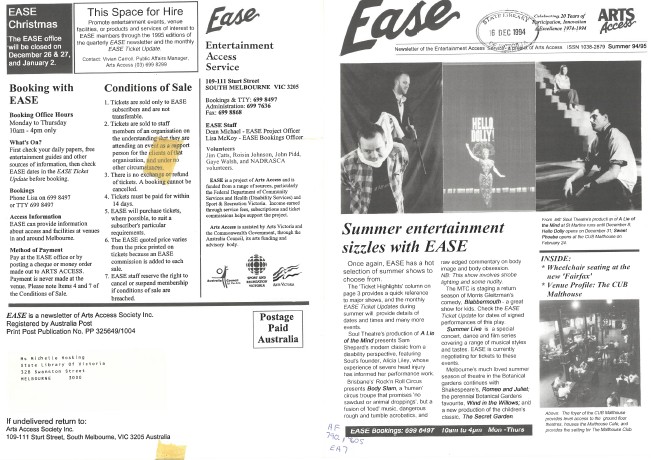 “Arts Access Victoria EASE Entertainment Access Service Newsletter Summer 1994-1995" Arts Access Victoria EASE Entertainment Access Service Newsletter Summer 1994-1995 - Playhouse Access Policy, venue profile, CUB Malthouse, improved wheelchair seating at Melbourne Theatre Company Fairfax Theatre
“Arts Access Victoria EASE Entertainment Access Service Newsletter Summer 1994-1995" Arts Access Victoria EASE Entertainment Access Service Newsletter Summer 1994-1995 - Playhouse Access Policy, venue profile, CUB Malthouse, improved wheelchair seating at Melbourne Theatre Company Fairfax Theatre
